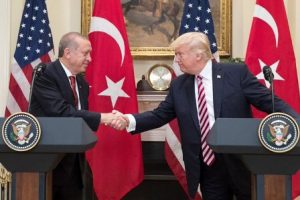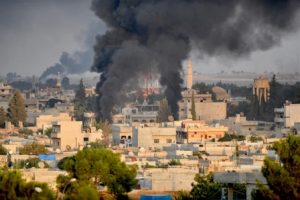The Growing Conundrum: Turkish Military Strikes in Syria
Days after President Trump’s recall of the US troops from Syria, Turkey has been offensive against the Kurdish forces that helped the US to defeat the Islamic State. The world will be watching what comes next?

President Donald Trump’s orders to move out American troops from Syria have created quite a turmoil in the already unstable contours of the Middle East. President Trump’s orders made the way clear for NATO ally Turkey to launch its own much-awaited military operation against the Kurds, who had been an American ally in northern Syria. During the US Presidential elections, Mr Trump had promised to get the US out of overseas wars, contending that the military’s involvement in Afghanistan, Iraq and elsewhere since 2001 had been largely a waste of lives and money.
The United States has spent EIGHT TRILLION DOLLARS fighting and policing in the Middle East. Thousands of our Great Soldiers have died or been badly wounded. Millions of people have died on the other side. GOING INTO THE MIDDLE EAST IS THE WORST DECISION EVER MADE…..
— Donald J. Trump (@realDonaldTrump) October 9, 2019
However, the President’s orders have been largely received with much disdain, even within the ranks of the Republicans, with many terming it as a catastrophic mistake; a mistake that may have implications far beyond Syria.
Also Read : Trumps Plans For Us Troops To Be Tweeted Out Of Syria Are Directionless
Many also questioned the Americans showing their backs to the Kurdish forces. The Kurdish forces of the area are part of the Syrian Democratic Forces or S.D.F. and have been a loyal ally of the US for years. They, in fact, have been a critical element in recapturing territories once controlled by the Islamic State. Syria’s neighbour on the north and NATO ally Turkey, however, considers the Kurdish fighters to be terrorists and has lobbied the US to abandon support for them.
The President’s decision to abandon our Kurd allies in the face of an assault by Turkey is a betrayal. It says that America is an unreliable ally; it facilitates ISIS resurgence; and it presages another humanitarian disaster. https://t.co/Tu8ARa8Pmp
— Senator Mitt Romney (@SenatorRomney) October 7, 2019
Turkey’s Mission and a Reluctant European Union
This will be Turkey’s third such excursion against the border with Syria since 2016. Turkey already has its troops on the ground across an arc of north-western Syria, which is the last stronghold of anti-Damascus rebels. The present military offensive is largely motivated by the aim of containing Syrian Kurdish power.
Turkey began its ‘Operation Syria or Operation Peace Spring’ with airstrikes which are expected to be supported by artillery and howitzer fire. The offensives are targeted at Kurdish militants and the Islamic State group in northern Syria.

Turkey has two major goals to achieve through its offensives. First, to drive the Kurdish YPG militia, it deems a security threat away from its border. Second, to create a space inside Syria where 2 million Syrian refugees can be settled, who are currently living in Turkey.
On its part, Turkey has long been planning military action against the Kurdish forces in northern Syria. Their close ties with the Kurdistan Workers’ Party (PKK) have been a big irritant for Turkey, as the PKK has a long history of waging a violent insurgency against the Turkish state since 1984.
The European Union has urged Turkey to end its military operation and aims to offer no support to the Turkish plans of a safe zone for the impending refugees, articulating that it will not provide any assistance or aid there.
The Onus Will Be On Turkey
A big cause of concern following a Turkish offensive in Syria will be the detained Islamic State fighters captured in recent years. Many of them have originated from many of the European nations, most of whom have not been accepted for detention by their country of origin. It is anticipated that with the Turkish onslaught, the S.D.F. may abandon camps to fight the Turks, potentially allowing at least 10,000 captured Islamic State fighter, including 2,000 foreigners to escape.
Also Read : Unplugging The Dreaded Islamic State
Allaying such fears, the Syrian Defence Forces leadership has confirmed that it will continue to detain the Islamic State fighters and their families in makeshift camps in northern Syria.
In the case, if the S.D.F does otherwise, then it is to be expected that Turkey would be responsible for taking over the detention centres. However, as stated by many American counterterrorism specialists, transferring counterterrorism responsibilities to a Turkish military force may witness a potential reversal of important victories achieved by the US troops and their Kurdish allies.
But even as President Trump talked in global terms, asking Turkey, Europe, Syria, Iran, Iraq, Russia and Kurds to figure out the situation once the US retreats, administration officials stressed that Special operation troops near the border will be relocated in coming days, but the total 1,000 troops in Syria will not be heading back to the US immediately. With the Turkish military mounting its offensive and the EU looking the other way, the region may certainly be plunging into more chaos in future.
